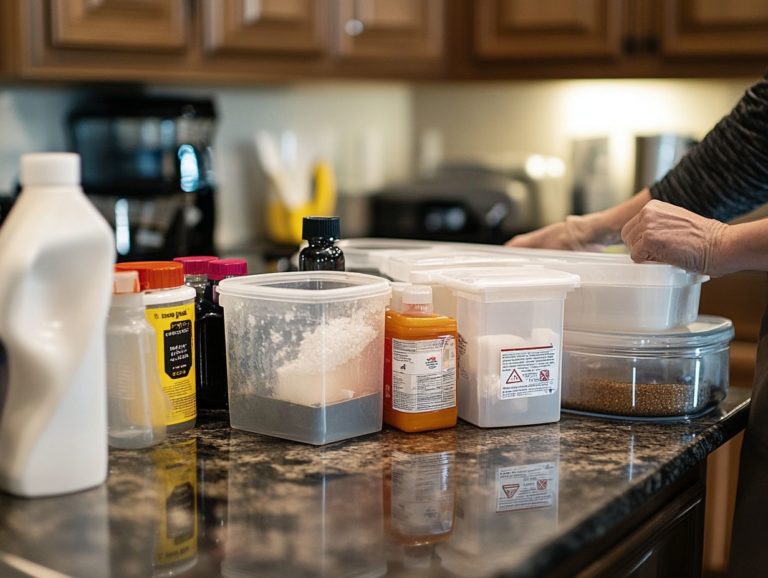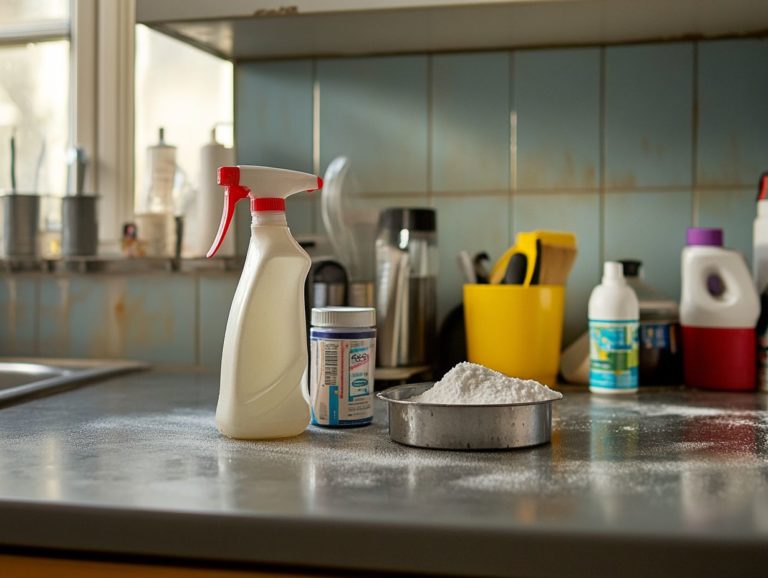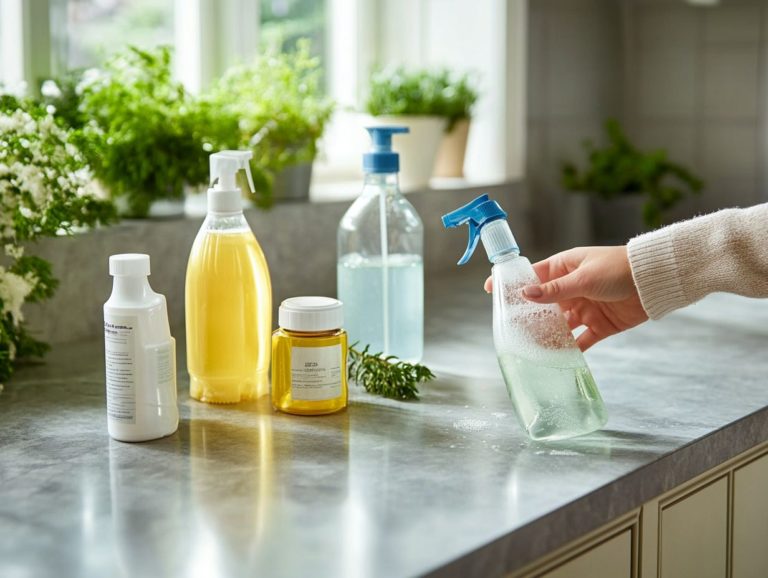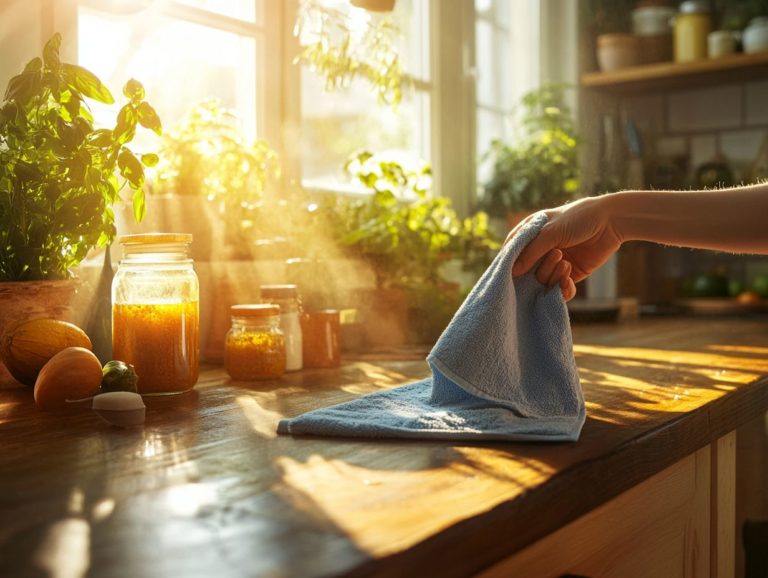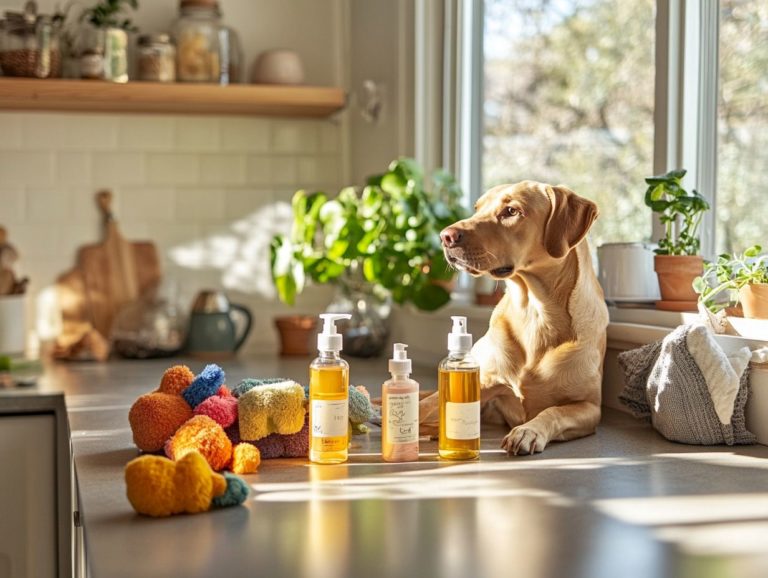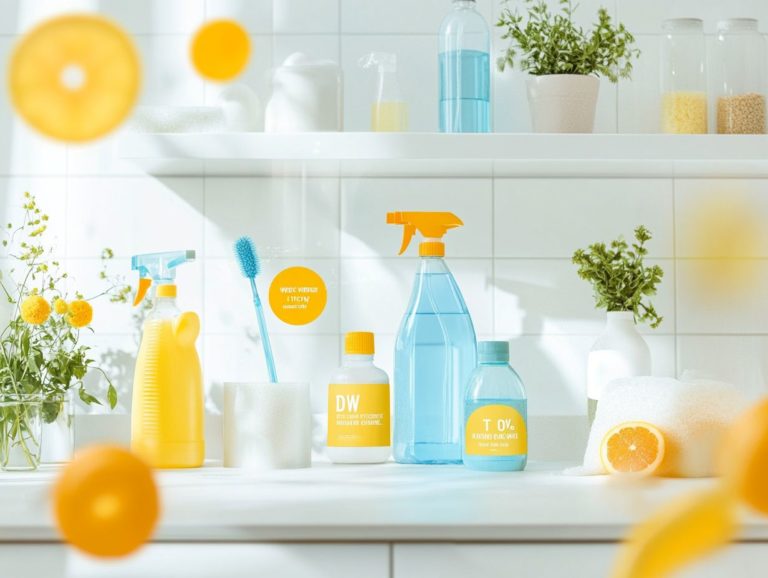How Do I Ensure My Cleaners are Safe?
In today s world, maintaining the cleanliness of your spaces is crucial. However, the safety of the household cleaners and cleaning products you choose can often slip under the radar. Recognizing potential hazards associated with these products is essential.
Many commercial cleaning agents contain harmful chemicals that can present significant health risks, including poisonous substances. This conversation underscores the importance of ensuring that your cleaning supplies are safe, understanding the potential dangers associated with using unsafe products, and learning how to identify and select safer alternatives.
You’ll also discover effective natural cleaning solutions and essential cleaning tips for their safe handling and proper storage. Together, let s create a healthier environment for you and your family.
Contents
- Key Takeaways:
- Why is it Important to Ensure Cleaners are Safe?
- What are the Risks of Using Unsafe Cleaners?
- How Can You Tell if a Cleaner is Safe?
- What are Some Safe Alternatives to Commercial Cleaners?
- How Can You Ensure Your Cleaners are Safe?
- Frequently Asked Questions
- How Do I Ensure My Cleaners are Safe?
- What safety precautions should I take when hiring cleaners?
- Should I provide safety equipment for my cleaners?
- What should I do if my cleaners get injured on the job?
- How can I ensure the safety of my cleaners while they are working in my home?
- What should I do if my cleaners are not following proper safety measures?
- Is it necessary to have a safety contract with my cleaners?
Key Takeaways:
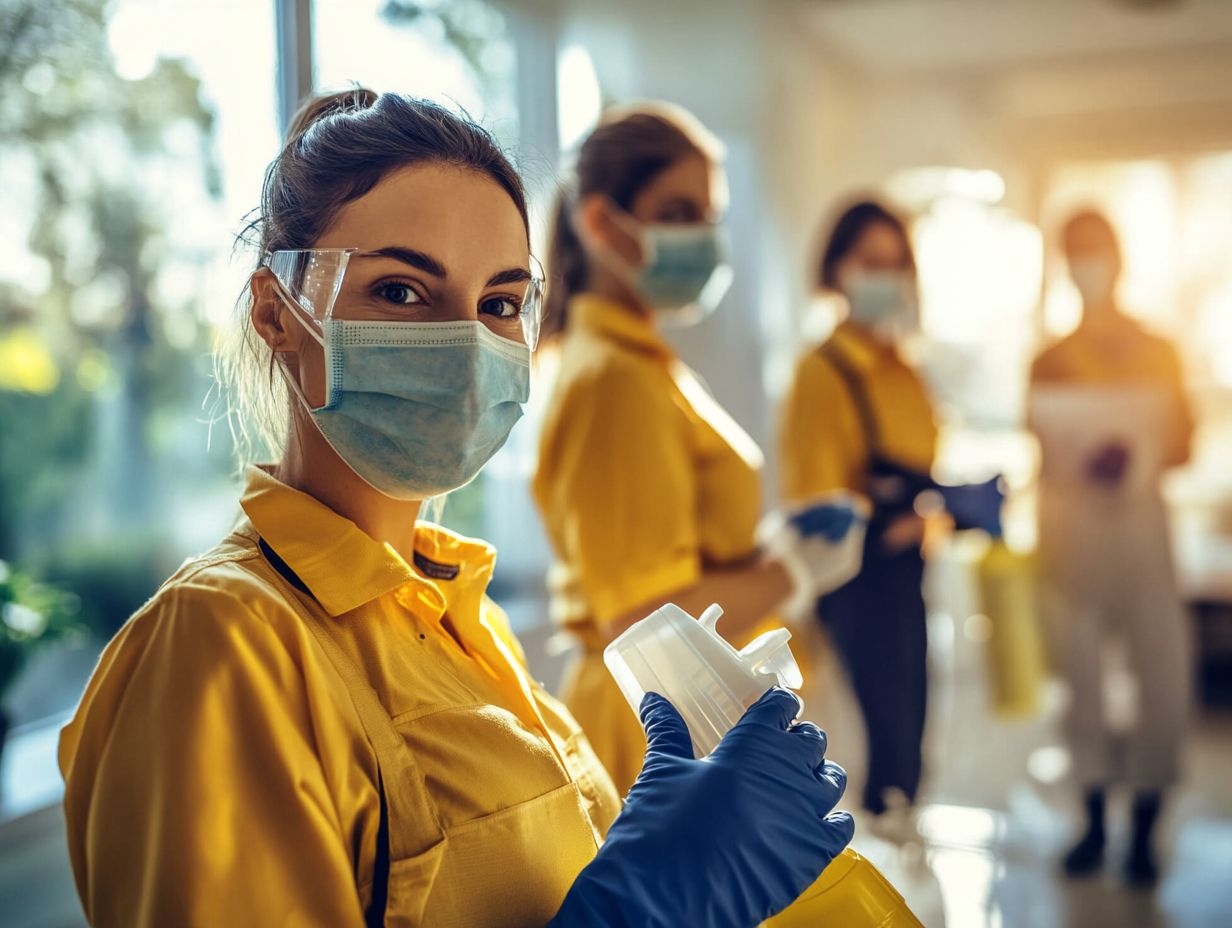
- Regularly checking the ingredients list and certifications can help ensure the safety of your cleaners.
- Proper storage and safety precautions while using cleaning products can prevent accidental exposure to harmful chemicals.
- Using natural ingredients and making your own cleaning products can be a safer alternative to commercial cleaners.
Why is it Important to Ensure Cleaners are Safe?
Ensuring the safety of household cleaners is vital for your health. It’s also essential for the well-being of children and pets who may come into contact with harmful substances.
With numerous cleaning agents containing potentially hazardous ingredients, your need for safety precautions becomes paramount. Open windows for fresh air and use protective equipment to minimize risks.
The presence of toxic substances like a common bleach ingredient and ammonia can lead to serious health concerns if not handled with care. The rise of eco-friendly options reflects an increasing awareness about safety and health.
Choosing your cleaning products wisely is essential for a safe home, prioritizing both effectiveness and safety in your environment.
What are the Risks of Using Unsafe Cleaners?
Using unsafe cleaners can expose you to significant risks. These range from mild irritation to severe health complications such as respiratory issues and even accidental ingestion, which may lead to a pediatric emergency.
The dangers associated with chemical exposure to substances like bleach and lye don’t just impact adults; they also pose serious risks to children and pets. This emphasizes the importance of being aware of the ingredients in your cleaning products and considering eco-friendly options.
What Chemicals are Harmful in Cleaning Products?
Certain chemicals commonly found in cleaning products can be particularly harmful. These include sodium hypochlorite, ammonia, ethylene glycol, trisodium phosphate, and various quaternary ammonium compounds. These substances can lead to serious health issues, especially when mixed incorrectly, resulting in toxic reactions and heightened irritation symptoms.
Take sodium hypochlorite, for example often found in bleach. It can cause respiratory problems and skin irritation. Then there’s ammonia, which can lead to severe burns and worsen asthma symptoms.
Ethylene glycol, primarily used in specific window cleaners, poses a risk of kidney damage when inhaled or absorbed through the skin. Trisodium phosphate can irritate both the eyes and skin and has potential long-term effects on aquatic environments. Additionally, quaternary ammonium compounds used in some disinfectants can cause severe irritation symptoms.
Given these dangers, it’s essential for you to diligently read labels and fully understand the ingredients in the cleaning products you choose. This awareness not only helps you avoid harmful exposure but also encourages you to explore safer alternatives, ultimately contributing to a healthier living space. Brands like Vital Oxide, Z BioScience, and SIMIX offer safer options.
What are the Possible Health Effects of Unsafe Cleaners?
The health effects of using unsafe cleaners can vary significantly. These range from mild irritation to severe complications, such as respiratory issues and skin irritation. This is especially concerning for sensitive individuals, including children and pets. In extreme cases, exposure to these cleaners could lead to a pediatric emergency, necessitating urgent calls to healthcare facilities. Cleveland Clinic experts like Purva Grover, MD, and Eva Love, MD, emphasize the importance of child safety in these situations.
Unsafe cleaners often contain dangerous chemicals that can trigger asthma attacks or worsen existing conditions in children whose bodies are still developing. The risk of accidental ingestion is significant and creates a considerable burden for you as a caregiver. You strive to maintain a clean environment without compromising the safety of your loved ones. The coronavirus pandemic has further heightened the need for vigilant cleaning practices.
Vulnerable groups, including the elderly and individuals with pre-existing health conditions, also face increased risks. You must switch to safer, non-toxic alternatives today for your loved ones safety! These alternatives ensure both cleanliness and health, creating a safer living space for everyone involved. Professional cleaning services like Kirkwood can offer solutions that adhere to safety standards.
How Can You Tell if a Cleaner is Safe?
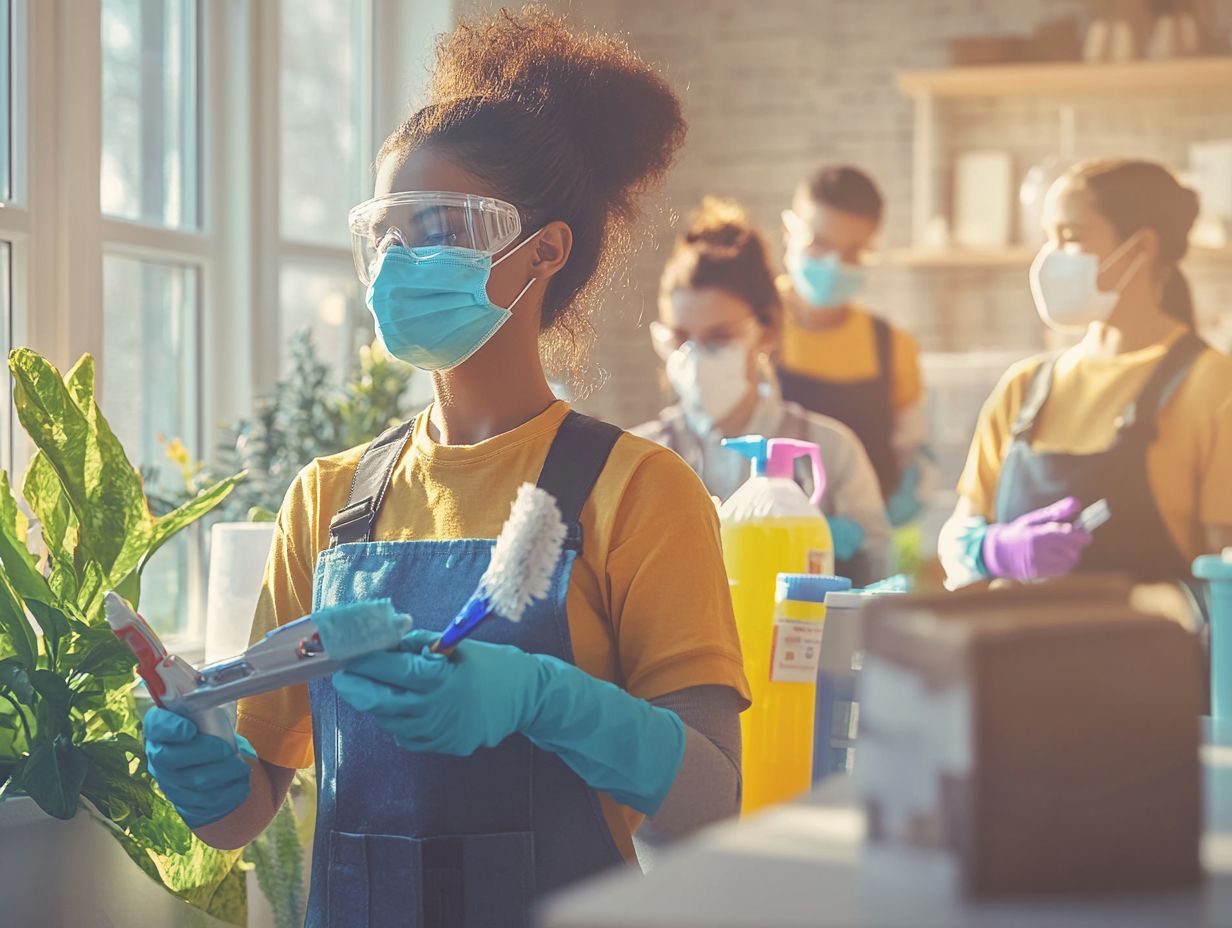
When assessing the safety of a cleaner, consider several key factors. Start by scrutinizing the ingredients list for any harmful substances. Pay attention to safety precautions and irritant warnings on the label. Avoid mixing cleaners to prevent toxic reactions.
Wearing protective equipment while handling these cleaners and ensuring proper storage can greatly minimize the risks associated with chemical exposure. Keeping hand sanitizer nearby can also help reduce the risk.
What to Look for in the Ingredients List?
When you review the ingredients list of cleaning products, be vigilant about harmful chemicals like sodium hypochlorite and ammonia. Seek out eco-friendly options that minimize health risks. Look for products that carry irritant warnings to inform you of potential dangers associated with exposure.
This approach protects your well-being and fosters a healthier home environment. Be wary of terms like “fragrance,” which can hide a myriad of unlisted toxic substances. By prioritizing products with recognizable ingredients, you can make more informed choices.
Choosing eco-friendly alternatives, especially those certified by reputable standards like Green Seal or the EPA’s Safer Choice, offers the dual benefits of sustainability and reduced chemical exposure. With mindful selections, you are not only safeguarding your health but also contributing to ecological conservation efforts and making a positive impact on the planet. For instance, products like Lysol are EPA-certified and provide effective cleaning without compromising safety.
Are There Any Certifications for Safe Cleaning Products?
When it comes to cleaning products, various certifications can assure you of their safety. Look for labels from reputable organizations like the EPA, which evaluates products for eco-friendliness and effectiveness in a safe manner. These certifications help you make informed decisions about the cleaning products entering your home. Brands like Vital Oxide and Z BioScience often carry these certifications.
In addition to EPA certifications, keep an eye out for seals from organizations like Green Seal, which guarantees that products meet rigorous environmental standards. The Cradle to Cradle certification is another valuable indicator, emphasizing safe and sustainable manufacturing processes. Certifications from the American Chemical Society can also indicate that a product has undergone stringent safety testing.
These labels bolster your confidence in a product’s reliability and provide transparency about the ingredients. This allows you to choose products that align with your values concerning health and environmental sustainability.
Join the conversation! Share your favorite safe cleaning products or techniques to help others make informed choices for a healthier home.
What are Some Safe Alternatives to Commercial Cleaners?
You ll find that safe alternatives to commercial cleaners often embrace natural ingredients, delivering effectiveness while significantly minimizing the risks linked to harsh chemicals. These natural cleaning products help ensure child safety and reduce overall chemical exposure.
These eco-friendly choices foster a healthier home environment and prioritize child safety.
What Natural Ingredients Can Be Used for Cleaning?
Natural ingredients like vinegar, baking soda, and essential oils serve as your go-to cleaning allies, offering safe and non-toxic alternatives to traditional cleaning products. These powerhouse ingredients tackle grime effectively while creating a healthier environment free from harmful chemicals.
Vinegar excels at cutting through grease and mineral buildup, making it an outstanding choice for cleaning your kitchen surfaces and appliances. Mixing vinegar with water in a spray bottle enhances its effectiveness while leaving behind a refreshing aroma that brightens your space. It’s a great alternative to harsher chemical products that may cause irritation.
Baking soda, with its gentle abrasive qualities, is a fantastic scouring agent for sinks and bathrooms. It works wonders at neutralizing odors, banishing unpleasant smells from carpets and upholstery as if they never existed. It’s a safer option compared to products with potentially dangerous ingredients like trisodium phosphate.
Essential oils like tea tree and lavender add a delightful fragrance to your cleaning routine. They pack a punch with their antimicrobial properties, making them perfect for disinfecting surfaces. Products like Z BioScience and SIMIX utilize these oils to combine effectiveness with safety.
How to Make Your Own Safe Cleaning Products?
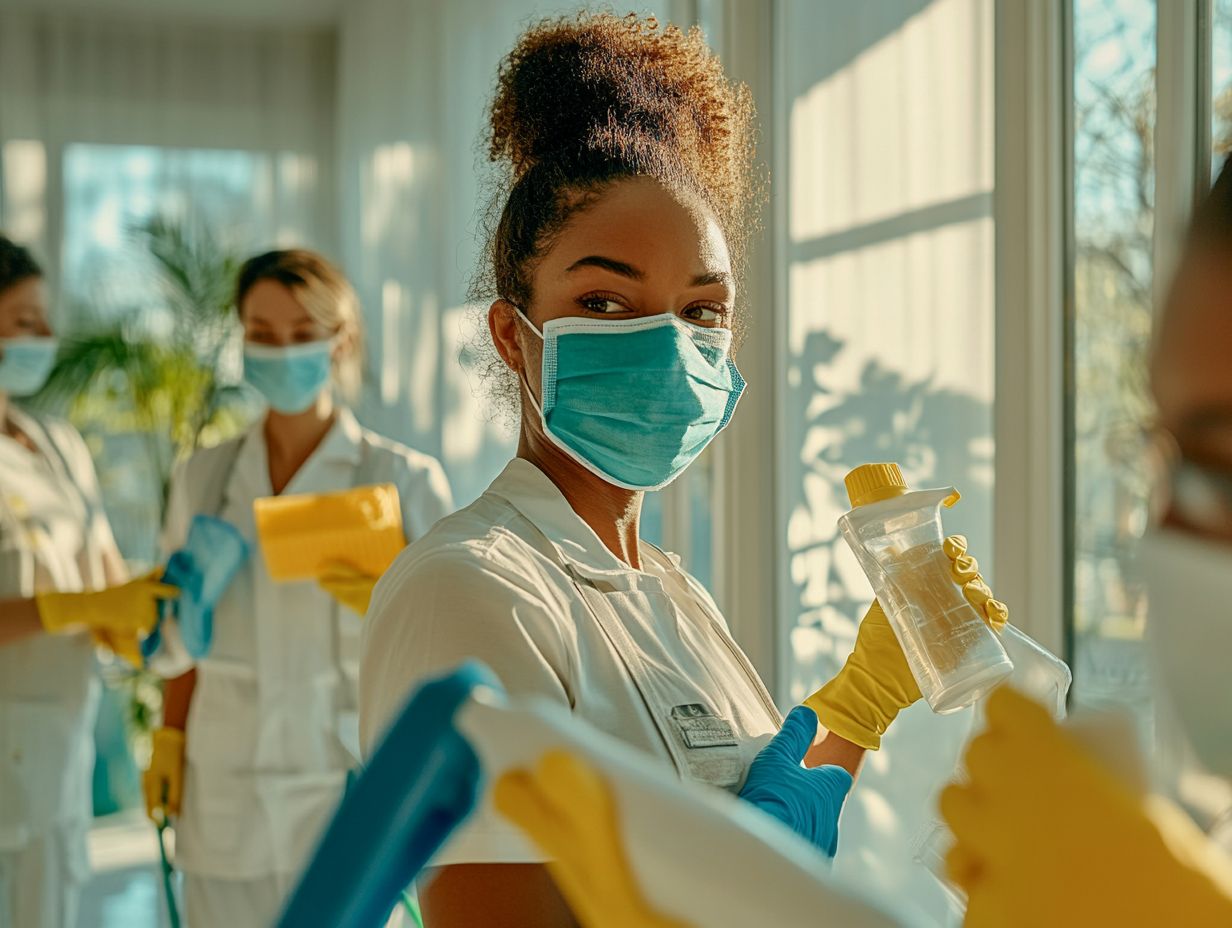
Start making your own cleaning products today for a healthier home! Creating your own cleaners is a straightforward process that enables you to control the ingredients and avoid harmful chemicals often found in commercial options.
By utilizing simple, natural ingredients, you can craft effective homemade cleaners that are safe and eco-friendly. This simple approach creates a healthier home for you and your loved ones.
Picture stepping into a home that exudes freshness and is free from toxins, all achieved by mixing a few common household items. Essential oils, vinegar, baking soda, and lemon juice are powerful allies against dirt and grime, making them perfect for various surfaces.
As you embark on this DIY cleaning journey, you’ll discover how simple it is to create a multi-surface cleaner or a laundry detergent that rivals if not surpasses the effectiveness of store-bought alternatives. Embracing these methods safeguards your family and pets while contributing to a cleaner planet.
How Can You Ensure Your Cleaners are Safe?
Ensuring the safety of your cleaning products requires proactive measures, including proper storage, utilizing protective equipment, and strictly adhering to safety precautions while handling these substances.
By staying vigilant and well-informed, you can significantly mitigate the risks associated with chemical exposure, ultimately safeguarding the well-being of both your family and your pets.
Join the movement towards a cleaner, greener home today!
How to Properly Store Cleaning Products?
Proper storage of cleaning products is essential for ensuring child safety and preventing accidental exposure to hazardous materials. Keep cleaners in a secure space, away from children and pets, and ensure they are tightly sealed to reduce the risks of chemical exposure.
Consider using cabinets with child-proof locks for added protection. Placing items on high shelves, out of reach of smaller hands, is also advisable. Regularly assess and declutter these storage areas to safely discard any expired or unnecessary products.
Always read and follow the manufacturer s instructions for storage. Take the time to label containers clearly to avoid confusion. Engaging your children in conversations about the dangers of these products can help promote safety awareness.
By prioritizing secure storage practices, you can greatly lower the chance of accidents and create a safer home environment for your family.
What Precautions to Take When Using Cleaning Products?
When using cleaning products, taking necessary precautions is vital to minimize the risk of irritation and chemical exposure. It’s important to wear protective gear like gloves and masks. Ensure good ventilation in the areas you re cleaning to maintain safety during these tasks.
It’s also important to carefully consider the type of cleaning product you choose. Some products can release harmful fumes or trigger skin reactions. Always take a moment to read the labels so you understand the ingredients and recommended usage.
Employing proper application techniques like using only the smallest amount necessary and applying products in well-ventilated spaces can further reduce health risks. Storing cleaning materials out of reach of children and pets is another crucial safety measure to prevent accidental poisoning.
Follow these guidelines to make your cleaning safer and easier!
What to Do if Accidentally Exposed to Unsafe Cleaners?
If you accidentally come into contact with unsafe cleaners, act quickly to reduce the risks associated with irritation symptoms and potential health hazards. If symptoms are severe or if children or pets are involved, make an emergency call to poison control or medical services.
Your first step should always be to ensure the affected person or animal is moved to an area with fresh air. This immediate action can greatly reduce the chances of inhaling harmful fumes. Next, carefully read the product label for specific first aid instructions, as certain cleaners may need particular treatment.
If the chemical has contacted skin, rinsing the area gently with lukewarm water for at least 15 minutes is crucial. Seek professional help if you experience symptoms like difficulty breathing, persistent coughing, or skin burns. These could indicate serious conditions needing advanced medical attention.
Frequently Asked Questions
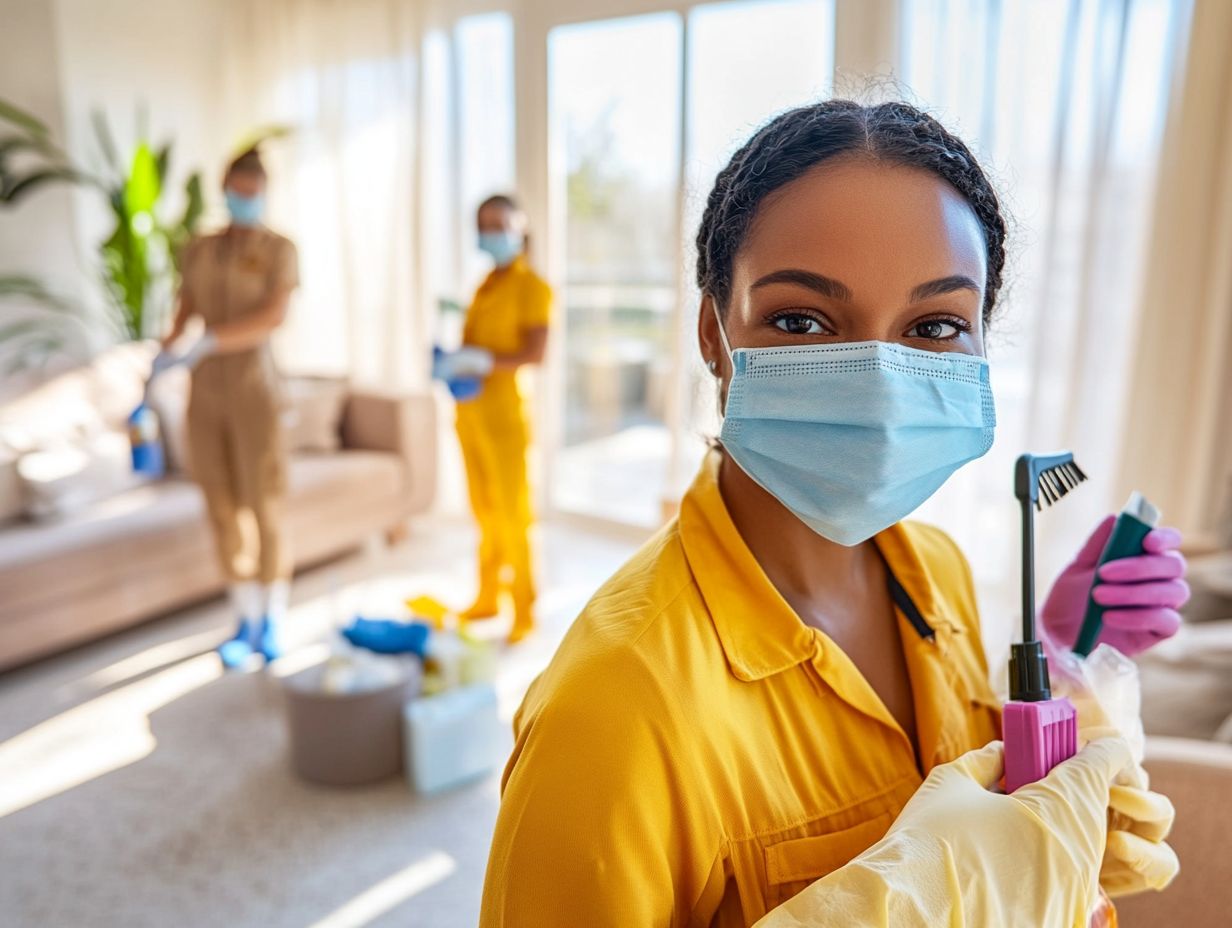
How Do I Ensure My Cleaners are Safe?
Safety is a top priority when hiring cleaners for your home or business. Here are some frequently asked questions about how to ensure the safety of your cleaners.
What safety precautions should I take when hiring cleaners?
Before hiring cleaners, conduct a background check and ask for references. Inquire about their training and if they have any certifications for handling cleaning products.
Should I provide safety equipment for my cleaners?
It is recommended to provide safety equipment such as gloves, masks, and eye protection for your cleaners. This not only protects them from potential hazards but also shows that you prioritize their safety.
What should I do if my cleaners get injured on the job?
If an injury occurs, having workers’ compensation insurance is important to cover medical expenses and lost wages. Discuss this with your cleaners before they start working for you.
In conclusion, taking the necessary precautions when using and storing cleaning products is vital for a safe environment. Stay informed, and prioritize safety for yourself and your cleaners.
How can I ensure the safety of my cleaners while they are working in my home?
Communicate any potential hazards in your home. This includes slippery floors and fragile items.
Ask your cleaners to use eco-friendly and non-toxic cleaning products to reduce health risks.
What should I do if my cleaners are not following proper safety measures?
If you notice that your cleaners are not following safety protocols, address it immediately.
Provide them with proper training or find another cleaning service that values safety.
Is it necessary to have a safety contract with my cleaners?
A safety contract can protect both you and your cleaners. It should outline safety procedures, expectations, and consequences for not following them.
Protect yourself and your cleaners safety should always come first!

